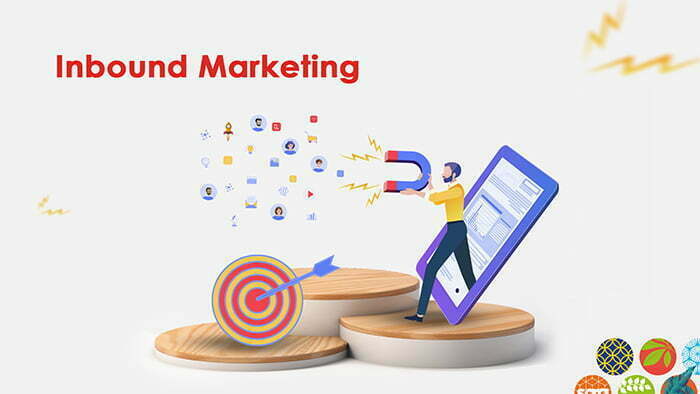Before delving into the significance of inbound marketing for lead generation, it’s important to understand the importance of inbound marketing. Inbound marketing is a strategic business approach that draws customers through valuable content and tailored experiences.
This methodology centers around creating top-notch content to captivate individuals and aligns with their interests. Through this approach, businesses focus on attracting potential customers to their brand.
In an era where consumers seek answers, conduct industry research, assess competitors, and evaluate product choices online, inbound marketing emerges as a pivotal strategy. Its core objective is to tailor content to address every stage of the buyer’s journey, effectively capturing the attention of interested prospects where they naturally reside online.
What is The Importance of Inbound Marketing?
Inbound marketing plays a crucial role in today’s digital landscape, transforming the way businesses attract, engage, and retain customers. and here are the importance of inbound marketing:
1. Customer-Centric Approach:
Inbound marketing places customers at the forefront, forging connections with individuals genuinely interested in your offerings. By aligning content with their needs, you establish a more meaningful connection.
2. Lead Generation and Conversion:
Inbound marketing excels in lead generation and conversion by engaging potential customers with relevant content, nurturing their interest, and eventually converting them into loyal patrons.
3. Customer Retention:
The value of inbound marketing doesn’t diminish after the initial conversion. It fosters customer retention by consistently delivering valuable content, nurturing the relationship, and encouraging repeat business.
Read More: Inbound vs. Outbound Marketing
4. Enhancing Social Media Marketing:
Inbound marketing’s ripple effect positively impacts social media marketing plans. It bolsters brand awareness, optimizes search engine visibility (SEO), and facilitates continuous engagement with your brand.
5. Budget-Efficiency:
Inbound marketing is a cost-effective approach, generating qualified leads with a more modest budget compared to traditional marketing methods.
6. Empowering Informed Decisions:
Inbound marketing empowers consumers with comprehensive information to make informed purchasing decisions. It guides them through the buyer’s journey, addressing queries and concerns along the way.
7. Systematic Customer Communication:
Inbound marketing revolves around systematic communication with potential clients, guiding them through the entire journey until they become loyal customers.
8. Amplified Website Traffic:
Inbound marketing translates into a noticeable surge in website traffic. As captivating content draws visitors, the overall impact on online presence is significant.
9. Mutually Beneficial Deals:
Inbound marketing ensures that all transactions result in advantageous outcomes for both customers and your business, fostering trust and satisfaction.
Read More: 10 steps to developing your brand
Inbound Marketing Strategies
Inbound marketing strategies revolve around emphasizing the importance of inbound marketing, attracting, engaging, and delighting customers through valuable content and experiences. These strategies center on the importance of inbound marketing, building trust and relationships with potential customers rather than pushing direct sales messages. Here are some key inbound marketing strategies:
Content Creation:
Develop high-quality, relevant content such as blog posts, videos, infographics, and eBooks that address the needs and interests of your target audience. This establishes the importance of inbound marketing, and your expertise, and attracts organic traffic.
SEO (Search Engine Optimization):
Optimizing your content for search engines helps it rank higher in search results, making it easier for your target audience to find you when searching for relevant information.
Social Media Marketing:
Utilizing social media platforms to share the importance of inbound marketing, your content, engage with your audience, and build a community around your brand. This increases internal branding visibility and fosters interaction.
Email Marketing:
Sending personalized and valuable content to your subscribers, nurturing leads over time. This helps you stay top-of-mind and build a stronger relationship with your audience.
Lead Generation and Capture:
Using landing pages, forms, and call-to-actions to convert website visitors into leads by offering valuable resources in exchange for their contact information.
Marketing Automation:
Using tools to automate repetitive tasks such as email campaigns, lead scoring, and follow-ups, allows you to nurture leads efficiently.
Segmentation:
Dividing your audience into segments based on their characteristics and behaviors, allows you to deliver more targeted and relevant content.
Influencer Marketing:
Partnering with influencers or industry experts to amplify the importance of inbound marketing, your brand’s reach, and credibility.
Read More: What is influencer marketing
Webinars and Events:
Hosting online or in-person events & activations and webinars to educate and engage your audience on specific topics related to your industry.
Analytics and Optimization:
Regularly analyzing your strategies’ performance using data and adjusting your approach based on the insights gained.
The importance of inbound marketing stands as a dynamic strategy that not only elevates lead generation and conversion but also fosters enduring customer relationships. By aligning your efforts with customer needs and delivering compelling content, you create a powerful avenue for growth and engagement in today’s digital landscape.



